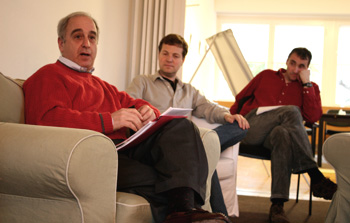
On Monday evening, just after dinner, students and faculty gathered for a discussion session on education in one of ECLA’s three student houses. The night turned out to be maybe one the most serious discussions we have had and maybe one of the most honest community experiences at ECLA.
The discussion was introduced by Richard Hersh, a renowned expert on education, currently a Senior Fellow at the Council for Aid to Education, member of the advisory board of the Bringing Theory to Practice project and co-editor of the book Declining by Degrees: Higher Education at Risk (Palgrave, 2005). Hersh presented his draft paper ‘A Well-Rounded Education for a Flat World’, in which he sketched out the current problems in the educational system of the US. Not only is depth lacking in the education in many disciplines but there are also serious shortcomings in the preparation for the professional culture, a ‘“flat” world of unrelenting, technology-equalizing, global economic competition’.
Hersh argues that student-teacher relationships in American universities are too shallow to provide for the intellectual and emotional well-being of the student, and are kept in place by institutional structures which prioritize research credentials over teaching qualities. The result is a growing disengagement with intellectual ideas among students, and a failure to make these arguments their own and to feel their emotional comport. Even at expensive Ivy-League colleges, education may fall short of helping students to become open-minded, reasonable human beings.
It is an unsettling picture that Hersh identifies, with high dropout rates, grade inflation, and psychological illness rife among students. Perhaps most worrying among the symptoms is students’ lack of those character assets which could help improve the world for everyone. According to Richard Hersh, small liberal arts colleges may well offer a theoretical solution, but in practice suffer greatly from the ‘consumerization’ of students, who believe themselves better serviced by a fancy swimming pool than a high workload. It is in reaction to this state of education that ECLA was called into existence.
Richard Hersh’s urgent and personal lecture served to open a long discussion, which continued well into the night. With education as the theme of the autumn trimester and over half a year of liberal arts education at ECLA behind us, we were more than prepared for the debate, which proved an occasion for sharing experiences. As the former president of several colleges (including Trinity College at Hartford), Richard Hersh openly shared his lively stories of students who, placed in a residential campus environment, are led to confront their own prejudices. ECLA professors continued in this vein, explaining the difficult pull between research and teaching, and the backbone needed to become a secure and authentic teacher. As students we disclosed our own experiences of studying liberal arts: the problems of having to compete with students wielding specialization degrees, the strength needed critically to doubt one’s own dear-held values and, above all, experiences of living on a small international campus. A former student was in attendance to recount his experiences in previous years, making for interesting comparison with our own. The deans in their turn shared their own difficult experiences of trying to create the optimal conditions – both intellectual and communal – for a unique group of people each year.
Sometimes it was difficult to listen to others voicing the ways that you have affected them, sometimes it was just funny. Every voice was simultaneously academic and deeply personal – exactly what Richard Hersh had called for so passionately in his paper.
By Martin Lipman (’08, Netherlands)
